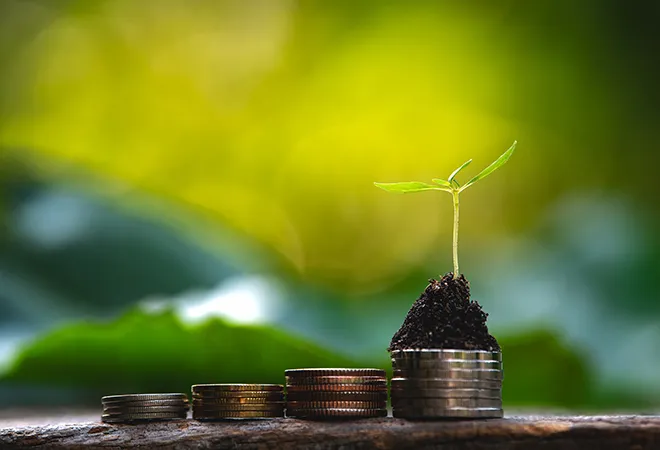
This article is part of the series—Raisina Edit 2022.
This is a critical moment in history, and international climate finance should be at the centre stage. There is both imperative and opportunity for a strong and sustainable recovery and to build back better after the COVID-19 pandemic. There is also an urgent need for a transformation to accelerate the transition to a net-zero, sustainable, inclusive, and prosperous future. Amid this, we face an energy crisis, which highlights the need for a harder and faster shift away from fossil fuels.
This is a new and different story of development to that of the past. In the past, development goals were treated as aspirational as the direction of progress was the main priority. What is different now is the severe pressure to act urgently and collectively at the scale required. When it comes to the immense task of tackling climate change, delay does not simply mean postponing a desirable outcome, or achieving the goals later. It is profoundly dangerous. The consequences of approaching or going beyond 2oC could be devastating—existential, for the lives and livelihoods of hundreds of millions, indeed billions, of people around the world—and we are now recognising that 1.5oC is a wiser target.
Delivering on this crucial agenda against a diminishing window of opportunity will require an exceptional push on the scale and quality of finance. This finance is—and must be seen as—an investment and not a cost. The more coordinated, front-loaded, and faster our actions are, the less costly they will be.
The consequences of approaching or going beyond 2oC could be devastating—existential, for the lives and livelihoods of hundreds of millions, indeed billions, of people around the world—and we are now recognising that 1.5oC is a wiser target.
Not only that, but they will also lead to a more attractive form of development, far superior to the dirty and destructive paths of the past forms of growth. Indeed, from now on, all investments should be sustainable and must work to combine development, mitigation, and adaptation. For developing countries, this means ensuring resilience to the climate change that is now unavoidable. It also means harnessing the opportunity to leapfrog the dirty phases followed by most developed economies, especially when it comes to defining their economic models and pathways and building their physical infrastructures so that they can meet growing energy needs through renewable sources. In a period of radical transformation, working to ensure a just transition should be a clear priority.
G20 Leadership and Climate Action
Altogether, the scale of investment needed for emerging and developing economies (excluding China) reaches an additional, relative to recent paths, US$800 billion per year by 2025 and close to US$2 trillion by 2030. Without this investment, we will not see sound development progress towards the Sustainable Development Goals and we will not be able to reduce emissions at the pace necessary. The investment is for development, and the extra cost to make it sustainable and low-carbon is small.
These investments must be fostered and financed, with clear implications for a need of significant scale up in international climate finance. Developed countries’ commitment to mobilise US$100 billion a year by 2020 to support developing countries on climate action is, in this context, both an intensely important symbol of trust and foundational to progress on climate action by developing economies.
But the scale of necessary investment shows clearly that developed countries must go beyond this commitment in three important ways: Delivering on the scale and quality of climate finance needed to ramp up ambition; utilising the complementary strengths of the different pools of finance rather than simply focusing on the aggregate number; and creating the necessary partnerships to deliver concrete results.
Developed countries’ commitment to mobilise US$100 billion a year by 2020 to support developing countries on climate action is, in this context, both an intensely important symbol of trust and foundational to progress on climate action by developing economies.
This can be achieved only with strong consensus and leadership from the G20. The agenda will need to be collaborative and broad, with change necessary across the global economy.
Current Delivery of Climate Finance
While there has been progress in both bilateral and multilateral public finance flows since 2013, climate finance flows attributable to developed countries were around US$20 billion short in aggregate of the US$100 billion per annum target by 2019. The climate finance assessment and delivery plan prepared by Jonathan Wilkinson, Canada’s natural resources minister, and Jochen Flasbarth, state secretary at the Germany’s environment ministry, at COP26 found that donors collectively fell short of the goal in 2020, but concluded—based on a comprehensive assessment of climate finance commitments by bilateral donors and multilateral institutions—that it would likely be met in 2023 and increase thereafter.
Beyond the scale, we have also fallen short of the quality of public climate finance. Persistent shortfalls include its poor predictability, an inadequate focus on adaptation and on poor and vulnerable countries, a low share of grants, and difficulties in access to climate finance, especially by poor and vulnerable countries. These issues will also need to be addressed.
A New Finance Agenda
The role of finance will be central in delivering the needed big push on investment and innovation, and in promoting a sustainable recovery and net-zero pathway. Public finance must lead the way, with the macroeconomic framework, including the fiscal stance, accommodating a significant step-up of investments. But public financing alone will not be sufficient to meet the demands of the climate crisis. The entire financial system needs to be mobilised and transformed. We must recognise that many countries, particularly poorer ones, face severe fiscal distress.
Private finance can help turn the billions of public-financed climate investment into trillions of total climate investment. However, private capital mobilisation today is far too low. Increasing it requires an enhanced partnership between emerging private sector coalitions, such as the Glasgow Financial Alliance for Net-Zero, and the official sector.
A country platform includes plans and conditions for productive investment and its finances within which investors can take decisions.
There is now emerging consensus that country platforms can serve as a basis for accelerating investment programmes and their financing. A country platform includes plans and conditions for productive investment and its finances within which investors can take decisions. Continuing to rely on an atomised process or on market forces alone will fall short of what is needed, and this is where country platforms can make a real difference. They should be built around countries’ nationally determined contributions and long-term strategies, visions, and policy frameworks, and provide room for multi-year long-term programmatic approaches that link to the scale and urgency. They also generate opportunities for key players across finance, both public and private, to converge and align at the country level.
Multilateral development banks must step up their role to help bolster the mobilisation of private finance through better upstream private mobilisation platforms, midstream project development support, and improved mitigation instruments and incentive structures.
The next decade will be critical for the future of the planet. We need strong action now to make all this happen and to deliver a positive and new story of sustainable development. Different parts of the financial system will need to be mobilised and take risks that they are best suited to influence and manage. This should include using the available firepower of the pool of unutilised special drawing rights; stronger contributions from private philanthropy; and the use of voluntary carbon markets.
G20 Compact on Investment and Finance
To deliver this agenda, change will need to be coordinated and different sources of finance combined. This is where G20 leadership can be effective.
About half of the needed resources could come domestically, including from improved domestic resource mobilisation, such as tax and subsidy reform and carbon pricing. International cooperation on a minimum tax threshold, tax avoidance and profit sharing, and equitable sharing of tax revenues can bolster national efforts. The G20’s ground-breaking achievement of a global tax agreement in October 2021 highlights the scale of ambition that can be expected in initiating reforms in that direction. Domestic capital markets will be a crucial part of domestic finance and progress will be necessary here as well.
The G20 is strongly placed to lead this agenda, and has done so since 2015, when it asked the Financial Stability Board to consider climate risk, and since launching the Sustainable Finance Working Group, which remains active today.
International climate finance must also step up, with the role of the multilateral development banks (MDBs) at the centre stage. The creation of the G20 commission to review MDB capital adequacy in July 2021 can function as a fertile space for innovation in pushing these powerful actors to achieve greater impact.
Private finance, both domestic and international, should play a much greater role going forward, given the pandemic’s weakening of government balance sheets. This requires the financial system to shift towards financing and supporting the transformation of the real economy. It requires a combination of measures to both transform and mobilise finance. The G20 is strongly placed to lead this agenda, and has done so since 2015, when it asked the Financial Stability Board to consider climate risk, and since launching the Sustainable Finance Working Group, which remains active today.
Looking ahead, aligning the financial system with sustainable development to deliver economic prosperity compatible with the Paris target of well below 2oC, and still better 1.5oC, will require the involvement of actors across the financial system, from international organisations, national policymakers, and regulators to the private sector, including ratings agencies, stock exchanges, and investors. The G20’s work has created important momentum. It is crucial that this continues to drive the agenda and is stepped up strongly.
The views expressed above belong to the author(s). ORF research and analyses now available on Telegram! Click here to access our curated content — blogs, longforms and interviews.




 PREV
PREV



